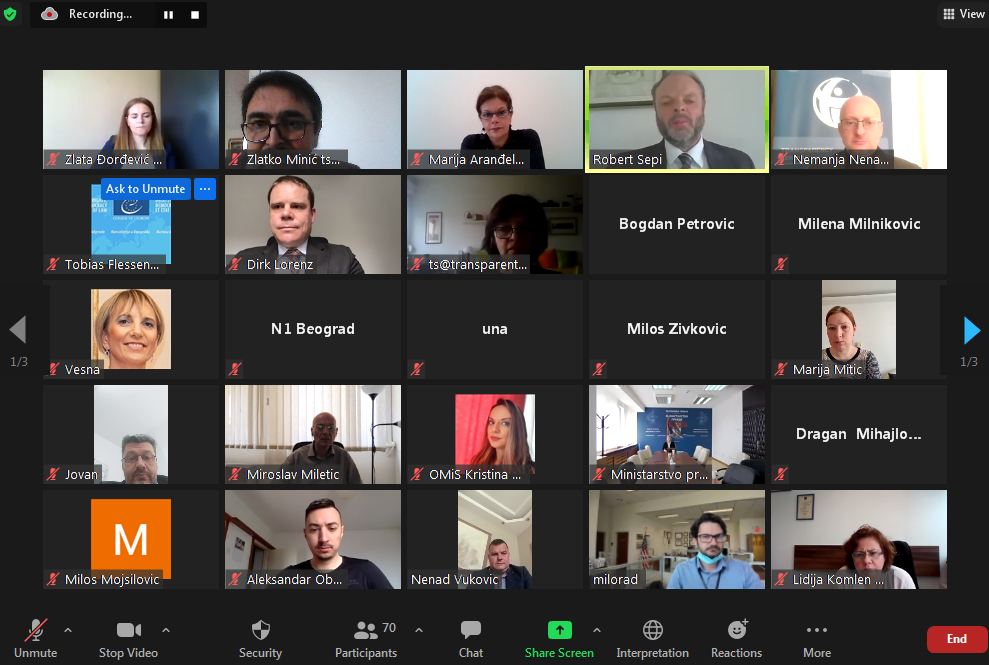Conference: Grand Corruption and Tailor-Made Laws in Serbia
Insufficient protection from the most severe forms of corruption in Serbia
In Serbia, elements of "state capture" are recognised in two important areas - the adoption of laws with provisions that favour private interests and the prosecution of grand corruption, shows the Transparency Serbia research presented today.
The existing normative and institutional framework in Serbia does not provide for the effective prosecution and punishment of all cases of grand corruption, and currently no measures are planned to solve all identified problems. Transparency Serbia therefore proposes expanding and specifying the competencies of the Prosecutor's Office for Organized Crime, introducing the possibility of applying special investigative techniques for all corrupt crimes, as well as introducing longer statutes of limitations for particularly serious cases of corruption.

The most dangerous type of corruption and capturing of state institutions is the situation when private interests, which conflict the public interest, are translated into the provisions of regulations. As part of the resaerch, Transparency Serbia has identified numerous such examples in last 12 years. At the same time, the prosecution was undertaken only in one case of tailoring regulations in the private interests.
TS research shows that the adoption of laws with provisions applying to only one project has become more frequent in Serbia, whereby such norms violate general rules, especially in the area of public procurement and land expropriation. Less obvious, but numerous are other examples where, in a non-transparent manner, laws and other regulations are enacted or amended so that the new norms are used exclusively by individuals or groups close to the top of the government.
All this is possible because the transparency of the process of drafting and passing laws, the visibility of external influences on decision-makers, and the protection of the constitutional principle of the unity of the legal order are not sufficiently ensured. Serbia has only recently regulated lobbying and established the obligation to perform an analysis of corruption risks in certain regulations, so it remains to be seen whether these mechanisms will help reduce these problems.
„Grand Corruption and Tailor-made Laws“ report is one of the research outputs of the EU-funded project „Ending Impunity for Grand Corruption in the Western Balkans and Turkey“, which aims to reduce corruption and state capture within the region.
The findings of the research were presented at the conference with introductory speeches of Mr Dirk Lorenz, Counsellor/Head of Political Section, EU Delegation to Serbia, Mr Tobias Flessenkemper, Council of Europe, Head of the Belgrade Office, and Ms Bojana Šćepanović, Secretary of State in the Ministry of Justice of Serbia.
Panelists Lidija Komlen-Nikolić from the Association of Public Prosecutors and Deputy Public Prosecutors of Serbia, and Robert Sepi from TS spoke about the fight against high-level corruption in Serbia, and Zlata Đorđević from TS spoke about laws tailored to private interests.
Among others, Jovan Bozovic from the Agency for the Prevention of Corruption, Miroslav Milicevic from the Anti-Corruption Council, Nenad Vukovic from the Serbian Lobbyists Associations, and journalists Vuk Cvijic and Slobodan Georgiev took part in the discussion.
The research can be downloaded here.
Recording of the conference is at the TS Youtube channel, link
https://www.youtube.com/watch?v=HQ_AV6L5zzU
Belgrade, 30 March 2021.



















